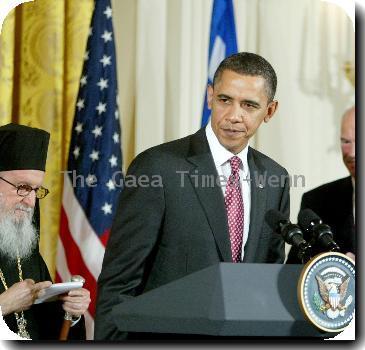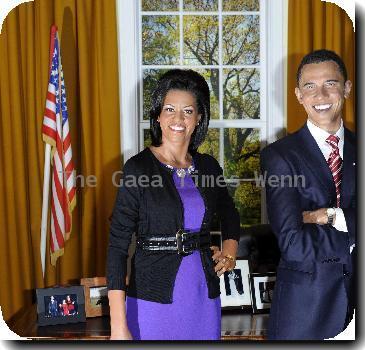Obama predicts Senate passage of new pact with Russia; GOP likely to go along, eventually
By Anne Flaherty, APThursday, April 8, 2010
Senate OK is next hurdle for arms control deal
WASHINGTON — President Barack Obama predicted on Thursday that enough Republicans will support his arms control treaty with Russia to win Senate approval by the end of the year.
History is on his side, even if numbers in the Senate are not. He will need 67 votes in a chamber where Democrats control 59 votes and in a sour political climate that could tempt Republicans to set aside the nonpartisan deference often given to national security treaties.
“There is a strong history of bipartisanship when it comes to the evaluation of international treaties, particularly arms control treaties,” Obama said in Prague, where he signed the new strategic nuclear weapons pact with Russian President Dmitry Medvedev.
Republicans were expected to swing behind the treaty if Obama can promise it won’t undercut the nation’s ability to set up missile defenses to protect against an attack from Iran or North Korea.
They also want assurances that the agreement will preserve what’s known as the “nuclear triad” — the nation’s ability to deliver nuclear weapons from the air, land and sea.
“The Senate will assess whether or not the agreement is verifiable, whether it reduces our nation’s ability to defend itself and our allies from the threat of nuclear armed missiles, and whether or not this administration is committed to preserving our own nuclear triad,” said Senate Republican Leader Mitch McConnell.
GOP officials say they won’t know the answer to those questions until senators are briefed on the treaty in detail and convene hearings.
Senate Majority Leader Harry Reid, D-Nev., said Thursday that he bets that Republicans won’t “play politics” on the issue.
“Strategic arms control treaties similar to this one have historically passed the Senate with strong bipartisan support, and I am confident that this agreement will receive the 67 votes from both sides of the aisle needed for passage,” he said in a statement.
Jim Manley, spokesman for Reid, said Democrats were hopeful they would have the votes but that “there are no slam dunks in the Senate anymore.”
The Democrats lost their 60-vote, filibuster-proof margin with the January election of Republican Sen. Scott Brown to fill the late Democrat Edward Kennedy’s Massachusetts seat.
Several Senate Republicans, including Arizona’s Jon Kyl and John McCain, have said they think Obama has put too many restraints on the nuclear arsenal, which could weaken the nation’s defense. Obama this week announced a new strategy that would narrow circumstances under which the weapons would be used.
But the treaty, which would cut back the size of the arsenal, has been less contentious. McCain, for example, has supported arms reductions in the past.
Speaking on PBS’ NewsHour, Kyl said he wants to review the treaty and the annexes before he decides on ratification.
“Well want to review all of that, have constructive discussions with the administration officials in charge of implementing it and then obviously talk to experts, have hearings and debate in the Senate,” Kyl said.
He added that the president’s modernization plan for the nation’s nuclear arsenal would also bear on his support for the treaty.
“Those two things go hand in hand,” Kyl said.
Democrats are hoping they could find support from Sen. Richard Lugar of Indiana, a moderate Republican steeped in nonproliferation issues and the top GOP lawmaker on the Senate Foreign Relations Committee.
Lugar has said he looks forward to hearings on the matter “so that we can work quickly to achieve ratification of the new treaty.”
Obama said he has talked about the treaty with the chairmen of the relevant Senate committees and would broaden those discussions now that it has been signed.
Obama gave no specific timeline other than by the end of the year. Some administration officials have suggested a vote is more likely after the midterm congressional elections in November.
The Constitution gives the Senate the power to consider treaties negotiated by the president. Approval takes two-thirds of the 100-member Senate, or 67 votes, and the Senate has the power to amend the language. The process is cumbersome by design, and intended to give pacts with foreign nations bipartisan support at home.
The Senate has approved most of the hundreds of treaties it has reviewed, but many others were sidelined or withdrawn by the White House to avoid defeat.
AP National Security Writer Anne Gearan contributed to this report.
Tags: Barack Obama, Eastern Europe, Edward Kennedy, Europe, International Agreements, North America, Nuclear Weapons, Political Organizations, Political Parties, Russia, United States, Washington, Weapons Administration, Weapons Of Mass Destruction







